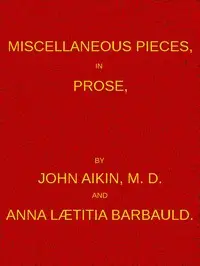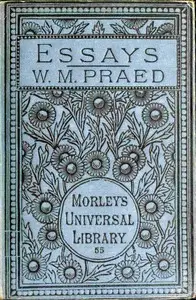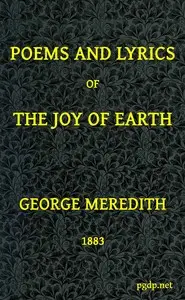"Miscellaneous Prose" by George Meredith is a compilation of essays and literary analyses from the late 1800s, offering Meredith's sharp insights on literary personalities and societal concerns. The collection explores themes of humor, ethical behavior, and what it means to be human, with a spotlight on writers such as W. M. Thackeray. The book starts by introducing Meredith's perspective on Thackeray’s writings, highlighting Thackeray's likable personality, wit, and analytical skills, implying that his humorous writings are rooted in a strong ethical understanding of society. The dialogue shifts into wider political and social views, including bits about the political environment of the time and Meredith's thoughts on Britain’s changing social landscape. The set of essays deliver historical thought and literary criticism, creating diverse exploration of culture during Meredith's life.

Miscellaneous Prose
By George Meredith
Through witty observations and critical analysis, this collection takes readers back in time to dissect literature and society with a sharp mind.
Summary
About the AuthorGeorge Meredith was an English novelist and poet of the Victorian era. At first, his focus was poetry, influenced by John Keats among others, but Meredith gradually established a reputation as a novelist. The Ordeal of Richard Feverel (1859) briefly scandalised Victorian literary circles. Of his later novels, the most enduring is The Egoist (1879), though in his lifetime his greatest success was Diana of the Crossways (1885). His novels were innovative in their attention to characters' psychology, and also portrayed social change. His style, in both poetry and prose, was noted for its syntactic complexity; Oscar Wilde likened it to "chaos illumined by brilliant flashes of lightning". Meredith was an encourager of other novelists, as well as an influence on them; among those to benefit were Robert Louis Stevenson and George Gissing. Meredith was nominated for the Nobel Prize in Literature seven times.
George Meredith was an English novelist and poet of the Victorian era. At first, his focus was poetry, influenced by John Keats among others, but Meredith gradually established a reputation as a novelist. The Ordeal of Richard Feverel (1859) briefly scandalised Victorian literary circles. Of his later novels, the most enduring is The Egoist (1879), though in his lifetime his greatest success was Diana of the Crossways (1885). His novels were innovative in their attention to characters' psychology, and also portrayed social change. His style, in both poetry and prose, was noted for its syntactic complexity; Oscar Wilde likened it to "chaos illumined by brilliant flashes of lightning". Meredith was an encourager of other novelists, as well as an influence on them; among those to benefit were Robert Louis Stevenson and George Gissing. Meredith was nominated for the Nobel Prize in Literature seven times.













